模块6 Unit 3 Understanding each other Reading(1):Cultural differences 课件(27张)
文档属性
| 名称 | 模块6 Unit 3 Understanding each other Reading(1):Cultural differences 课件(27张) | 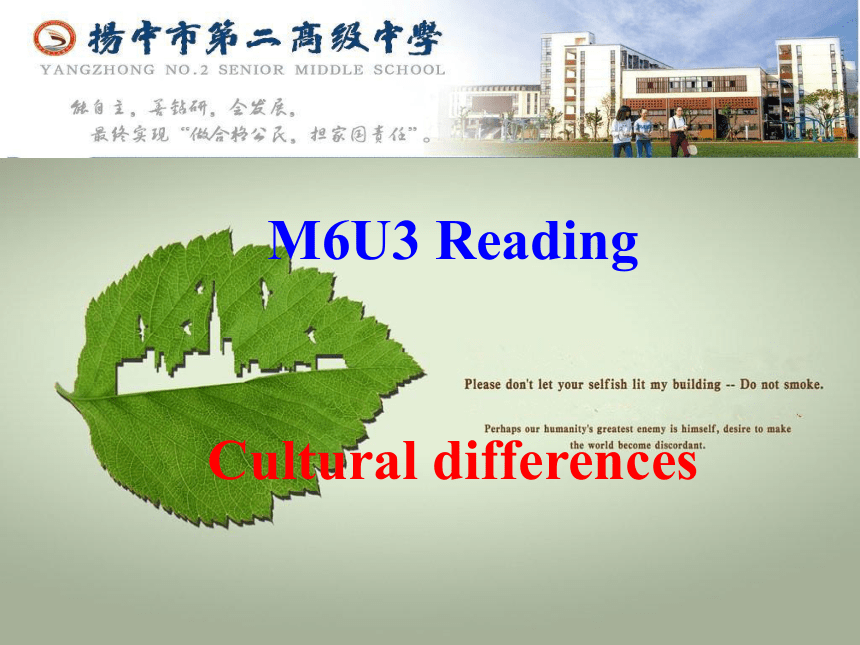 | |
| 格式 | zip | ||
| 文件大小 | 1.8MB | ||
| 资源类型 | 教案 | ||
| 版本资源 | 牛津译林版 | ||
| 科目 | 英语 | ||
| 更新时间 | 2019-07-30 18:47:08 | ||
图片预览

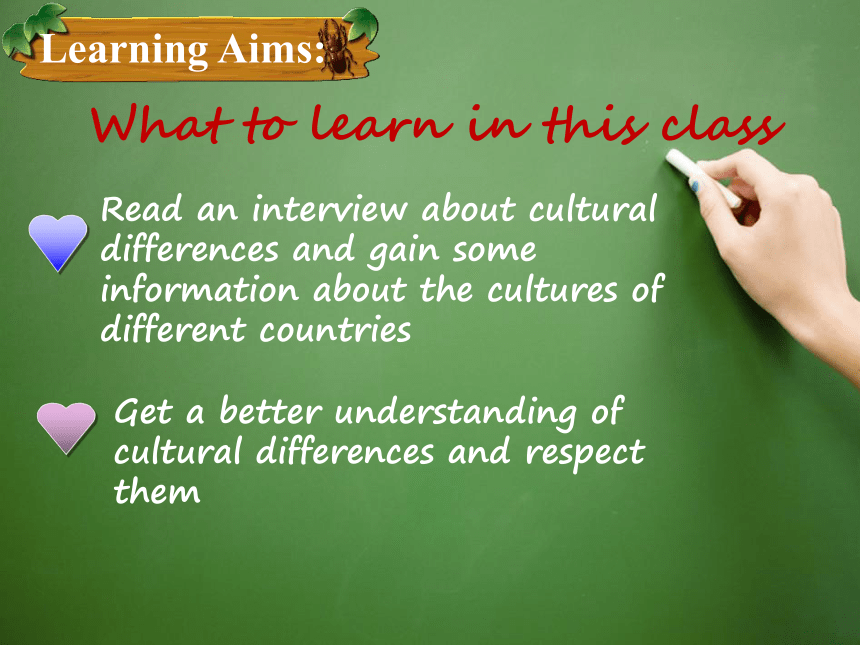
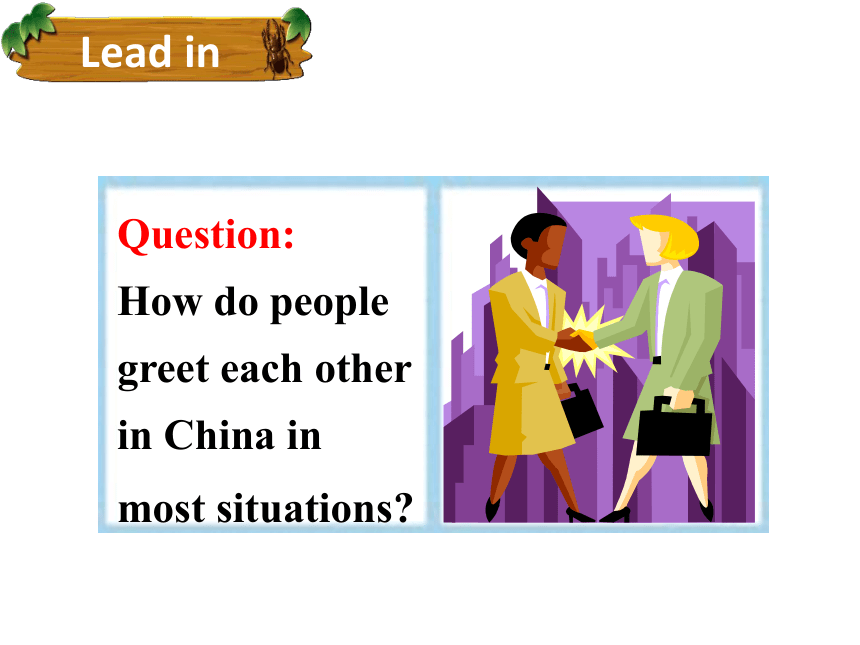


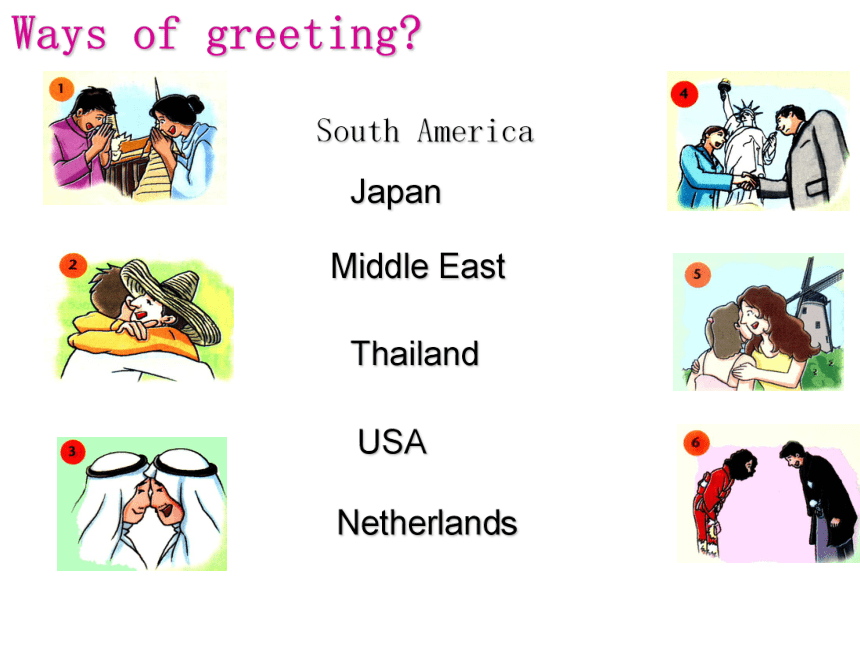
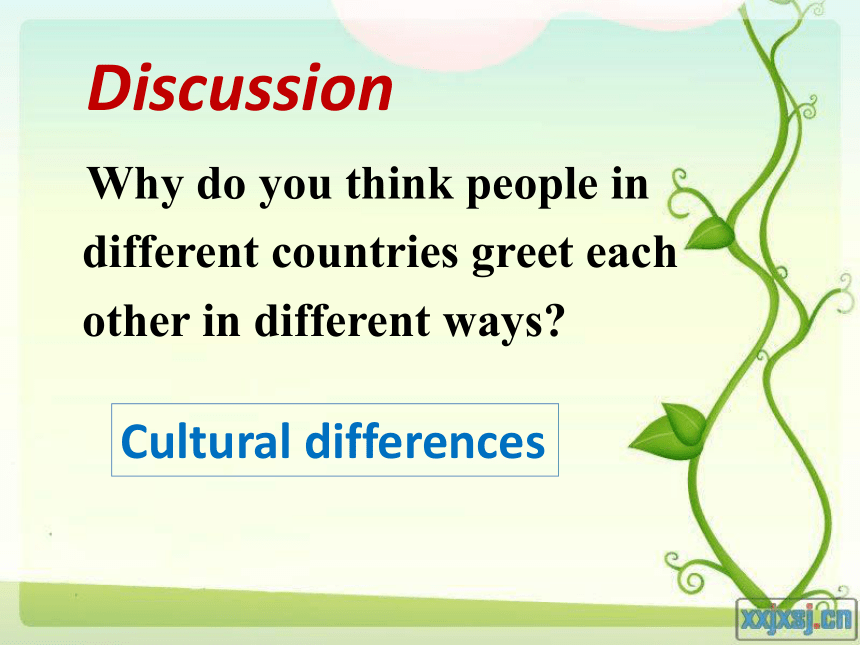
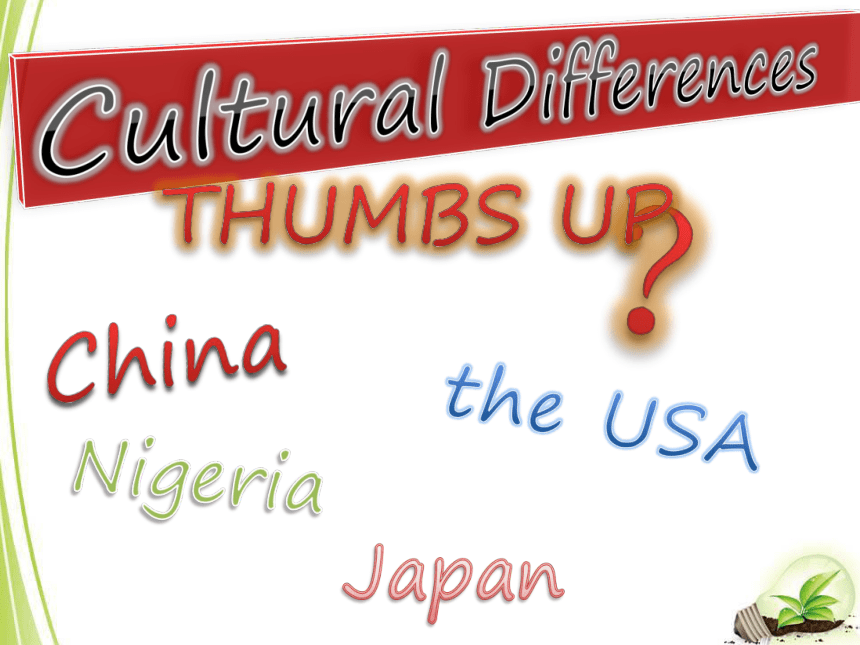
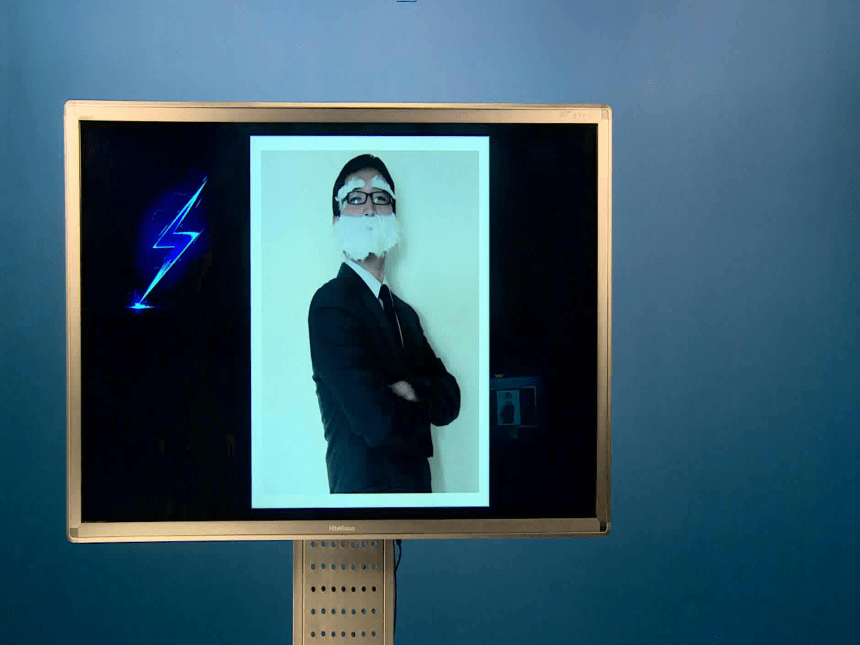
文档简介
课件27张PPT。M6U3 Reading
Cultural differencesWhat to learn in this classRead an interview about cultural differences and gain some information about the cultures of different countries
Get a better understanding of cultural differences and respect them Learning Aims:Question:
How do people greet each other in China in most situations? Lead-inLead invarious ways
of greetingCan you act out the ways of greeting?noddingsmilingwavingbowingShaking handshuggingWatch the pictures and guess where they come from.ReviewThailandSouth AmericaMiddle EastUSANetherlandsJapanWays of greeting? Why do you think people in different countries greet each other in different ways?Cultural differencesDiscussionthe USAChinaNigeriaJapanCultural Differences? THUMBS UPChina THUMBS UPthe USANigeriaJapan______________well done__________________________________________want a_______rudeNumber 5rideMatch the countries with the correct answers. Reading strategy Examples are often used : explain concepts and ideas support arguments interesting storiesIn this conversation, examples are used to explain the concept of cultural differences.1. to ; 2. to ;3. as .Fast ReadingGo through the text and match
each part with its main idea.The text can be divided into four parts:
PartⅠ: Line1-Line12
PartⅡ: Line13-Line22
PartⅢ: Line23-Line40
PartⅣ: Line41-Line59
Bonfire Night in the UK A wedding ceremony in KoreaReactions to receiving the presents in the UK A wedding reception and other two customs in Brunei Detailed reading Topic 1: Receiving presents (line5-13)
In the west, it is _____ and ______ not to open a present when someone gives you one, so the Brits and Americans open the present ____________they receive it.rudestrangeas soon asChinese
weddingKorean
weddingWedding in Western countries Topic 2: wedding ceremonies in Korea(19-22)Topic 2: Wedding ceremonies in Korea(Line13-22)is supposed to__________________is thought to__________________
is considered _______________
drive bad spirits away.
ensure good luck.
very lucky.The wedding ceremony in BruneiMen and women have to sit together at the wedding.
2. Food, soft drinks, tea and coffee are served, and alcohol is also permitted at the wedding.
3. People in Brunei celebrate the wedding by singing and dancing throughout the night.
4. People will take off their shoes before entering someone’s house. Topic 3: A wedding reception and two customs in Brunei (Line23-Line40) People in most countries point
with their__________.However, in Brunei cause ________thumbpointing gesture (line35-37)They usefirst fingerIn Brunei, they think it’s funny watching new foreign teachers trying to ______ to pointing with _______ instead of first finger.thumboffenceadjustBonfire Night (in the UK)Topic4: Bonfire Night (Line 41-52) November5thfirespartyfireworkshotdogsWatch the video and fill in the blanksConsolidationrudereactsstrangeliveensurecongratulatealcoholaccustomedthumbfestivalsEnjoy a videoEnjoy a video and pay attention to one or two
aspects in cultural differences.
2. Discuss with your teammates and give us an
oral report about your opinion about the
pictures.(what factors cause the cultural
differences, history,education,economy.etc)
Presentation
1. Do you think it is necessary to learn about cultural differences?
2. Why?
3. What attitudes should we hold towards the cultural differences?
(respect, understand, tolerate, adjust to)
WritingBy learning different cultures, we can:
◆ experience different cultures.
◆ communicate effectively and freely.
◆ strengthen relationships with others.
◆ avoid embarrassment, offence
or misunderstandings.
◆ get a better understanding of others. As an old saying goes,
when in Rome, do as the Romans do.Conclusion 1. Finish your writing and polish it up. Send it to my e-mail 474726725@qq.com.
2. Finish the exercises on P45/46(KKL). HomeworkIn America, it means ‘ok’.In India, it means ‘right’.In Thailand, it means ‘no problem’ In Japan and Korea, it means ‘money’.In France, it means ‘no money’.In Brazil and Greece, it means ‘offence’.Sharing time
Cultural differencesWhat to learn in this classRead an interview about cultural differences and gain some information about the cultures of different countries
Get a better understanding of cultural differences and respect them Learning Aims:Question:
How do people greet each other in China in most situations? Lead-inLead invarious ways
of greetingCan you act out the ways of greeting?noddingsmilingwavingbowingShaking handshuggingWatch the pictures and guess where they come from.ReviewThailandSouth AmericaMiddle EastUSANetherlandsJapanWays of greeting? Why do you think people in different countries greet each other in different ways?Cultural differencesDiscussionthe USAChinaNigeriaJapanCultural Differences? THUMBS UPChina THUMBS UPthe USANigeriaJapan______________well done__________________________________________want a_______rudeNumber 5rideMatch the countries with the correct answers. Reading strategy Examples are often used : explain concepts and ideas support arguments interesting storiesIn this conversation, examples are used to explain the concept of cultural differences.1. to ; 2. to ;3. as .Fast ReadingGo through the text and match
each part with its main idea.The text can be divided into four parts:
PartⅠ: Line1-Line12
PartⅡ: Line13-Line22
PartⅢ: Line23-Line40
PartⅣ: Line41-Line59
Bonfire Night in the UK A wedding ceremony in KoreaReactions to receiving the presents in the UK A wedding reception and other two customs in Brunei Detailed reading Topic 1: Receiving presents (line5-13)
In the west, it is _____ and ______ not to open a present when someone gives you one, so the Brits and Americans open the present ____________they receive it.rudestrangeas soon asChinese
weddingKorean
weddingWedding in Western countries Topic 2: wedding ceremonies in Korea(19-22)Topic 2: Wedding ceremonies in Korea(Line13-22)is supposed to__________________is thought to__________________
is considered _______________
drive bad spirits away.
ensure good luck.
very lucky.The wedding ceremony in BruneiMen and women have to sit together at the wedding.
2. Food, soft drinks, tea and coffee are served, and alcohol is also permitted at the wedding.
3. People in Brunei celebrate the wedding by singing and dancing throughout the night.
4. People will take off their shoes before entering someone’s house. Topic 3: A wedding reception and two customs in Brunei (Line23-Line40) People in most countries point
with their__________.However, in Brunei cause ________thumbpointing gesture (line35-37)They usefirst fingerIn Brunei, they think it’s funny watching new foreign teachers trying to ______ to pointing with _______ instead of first finger.thumboffenceadjustBonfire Night (in the UK)Topic4: Bonfire Night (Line 41-52) November5thfirespartyfireworkshotdogsWatch the video and fill in the blanksConsolidationrudereactsstrangeliveensurecongratulatealcoholaccustomedthumbfestivalsEnjoy a videoEnjoy a video and pay attention to one or two
aspects in cultural differences.
2. Discuss with your teammates and give us an
oral report about your opinion about the
pictures.(what factors cause the cultural
differences, history,education,economy.etc)
Presentation
1. Do you think it is necessary to learn about cultural differences?
2. Why?
3. What attitudes should we hold towards the cultural differences?
(respect, understand, tolerate, adjust to)
WritingBy learning different cultures, we can:
◆ experience different cultures.
◆ communicate effectively and freely.
◆ strengthen relationships with others.
◆ avoid embarrassment, offence
or misunderstandings.
◆ get a better understanding of others. As an old saying goes,
when in Rome, do as the Romans do.Conclusion 1. Finish your writing and polish it up. Send it to my e-mail 474726725@qq.com.
2. Finish the exercises on P45/46(KKL). HomeworkIn America, it means ‘ok’.In India, it means ‘right’.In Thailand, it means ‘no problem’ In Japan and Korea, it means ‘money’.In France, it means ‘no money’.In Brazil and Greece, it means ‘offence’.Sharing time
